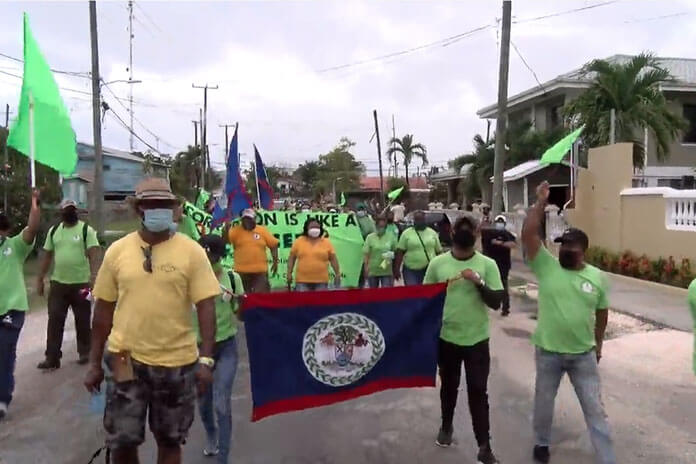ORANGE WALK. Tues. May 25, 2021– The Joint Unions are engaging in their fourth week of industrial action, which they say is an effort to both ensure the implementation of Good Governance legislation and express their opposition to the 10% salary cuts legislated by the government of Belize.
On Friday, members of all 10 branches of the Belize National Teachers Union (BNTU), as well as members of the Public Service Union (PSU), and members of the Belize Progressive Teachers Union, walked for three hours in Orange Walk and pushed over a barricade that was set up by the police to deter them from marching on the street on which the Prime Minister’s home is located.
The president of the PSU, Gerald Henry, told local reporters that they felt encouraged by the support of the public in Orange Walk. He also indicated that as their demonstrations continue, they will begin to invite the wider population to join the ranks of the unions.
He said that the march in Orange Walk Town on Friday was the largest procession yet to be staged by the Joint Unions. Members of all 10 branches of the BNTU were present, according to the national president of the BNTU, Elena Smith.
And while the large gatherings being staged by the teachers are being carried out in contravention of the Covid-19 regulations, the Police Department continues to exercise as much restraint as possible, according to Commissioner Chester Williams. He reiterated, however, that the recent acts of the union members, including the past blocking of traffic on bridges and roads, will not be tolerated, adding that police will ramp up their response if needs be.
“The actions of the teachers continue to be one, that is some extent, against the law. They’re picketing, they’re demonstrating without any permit, they are going about in large crowds, against what the Quarantine Regulation stipulates, and we continue to exercise restraint because we really and truly want to avoid any sort of confrontation with them, because a confrontation is not going to do either side any good.” Compol Williams explained.
He added, “Again I will sound the warning to the teachers that the actions are becoming intolerable, not only to the police but to the wider public, and it is something that while we understand what it is that they may be trying to fight for, there is a way of doing things, and when you follow an illegal route to do things, then that doesn’t make you any better.”
In regard to the unions’ removal of the police barrier from the entrance of Dunn Street, the leaders of the unions said that their actions on Friday were in line with the law and their right to free movement.
“Well, there was no other way, I believe, that we could have passed, and so I guess it was something that they felt we had to do in order to move around freely in this country. I believe that that street is still within Belize. I didn’t bring my passport today, and there is no Immigration at the entrance of the street, so I believe that we could have turned down there, and I guess that those who move the barrier felt the same way as I did. So we politely walked over the barriers. Nothing was destroyed, except probably the tape. If they want to, we can purchase it back for them, but what is the fear in us walking on a street?” remarked PSU president Gerald Henry.
In her remarks, Smith stated, “I don’t see why there would be a need for the PM to have them to block the street that he lives on, because nobody wants to go and do the PM anything. It’s a street, and we have a right to walk on the street, so I really don’t know the reason behind doing that. If it’s fear, then if you are afraid of your people, something is wrong.”
PSU president Gerald Henry noted that the route was chosen by the unions to send a message directly to the Prime Minister. The unions are still calling Prime Minister Briceño to come to the negotiation table.
“He is the leader of the country, right? So it is a way that we are trying to ask him to, please, Mr. Leader, come and lead us. You are our leader as the Prime Minister of the country, which is the leader of the government. We as public officers form the executive branch of the government. We are 14,000 plus in his charge, if you want to call it that, and you can’t come and sit around the table with us? We did that to ask him, please, Mr. Leader, come let us sit down, since you are the one who will ultimately make these decisions. Come around the table, so that when the decisions are made, at least we feel a bit more that they are final,” said Henry.

